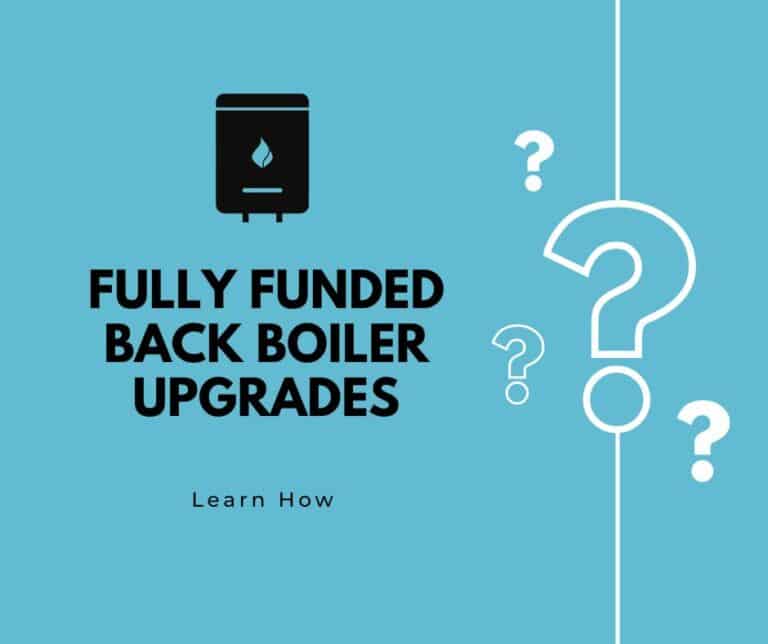We all know how important it is to have a warm and comfortable home, especially during the cooler months. Now there is a great opportunity for homeowners to upgrade their old back boilers with full funding! This is great news for anyone who has been looking for a way to make their home more energy efficient and to reduce energy costs. This grant scheme offers grants for the full cost of installation, making it an affordable option that could save households hundreds of dollars in energy bills each year. In some cases you’ll could even get your home insulated for free!
Back Boiler Upgrade Grants
Back boilers are outdated, inefficient and costly to run. Upgrading them to a more modern system could save you a lot of money on your energy bills. To help homeowners make the switch, fully-funded grants of up to £20,000 or more are available through the Government’s Energy Company Obligation (ECO) scheme.
The ECO scheme was created in 2013 with the aim of helping households reduce their carbon footprint and increase energy efficiency. It rewards those who upgrade their heating systems by providing access to specific grants that can be used towards installation costs. In addition to covering back boiler upgrades, these grants also cover a range of other measures such as wall, loft or roof insulation.
A new phase of the scheme launched at the end of 2022, and one of the big changes to the scheme is that back boiler upgrades are completed funded. This is good news for anyone with a back boiler that is looking to upgrade to a newer, more efficient boiler.
Eligibility: Who Can Apply?
The UK government has made available funds to encourage homeowners to replace their old, inefficient boilers with more eco-friendly options. To qualify for this scheme, you must meet certain criteria set out by the Department for Business, Energy & Industrial Strategy (BEIS). You must own your own home, live within England, Wales or Scotland and have a property that has an EPC rating of E, F or G. If you don’t have an EPC that’s okay, as the Registered Installer will carry out an energy assessment to ensure it falls in the right range. Installers actively advise not to get an EPC if you don’t have one already as it can affect the application process. In some areas band D applications are available, but in most cases band D properties will need to wait until later in the scheme (it runs until March 2026) as energy companies can only spend 15% of their allocation on Band D properties.
In addition, your household must either:
– Claim certain benefits
or
– Have a household income of less than £31,000
or
– Claim Child Benefit and meet income requirements
or
– Have a health condition
or
– A vulnerable person can also qualify (this includes young families and people older than 65)
We will delve into each of these ways to qualify in more detail below, but if you are ready to use the free grant checker you can jump straight to the free grant checker. The grant checker will ask you the relevant questions to see if you qualify.
Eligibility if you claim benefits
The following grants will qualify you for the grants without any income rules:
- Child Tax Credit
- Employment and Support Allowance (ESA) – Income Based
- Housing Benefit – new eligible benefit
- Income Support
- Jobseekers Allowance (JSA) – Income Based
- Pension Credit Guarantee Credit
- Pension Credit Savings Credit – new eligible benefit
- Universal Credit
- Working Tax Credit
If you’re considering claiming benefits, it is always checking eligibility as getting the benefit could also mean you are eligible for these grants. You don’t need to be currently claiming either, you are still eligible if you have claimed benefits in the 12 months prior to the installation.
If you claim other benefits such as
- Armed Forces Independence Payment
- Attendance Allowance
- Carer’s Allowance
- Constant Attendance Allowance
- Disability Living Allowance (DLA)
- Industrial Injuries Disablement Benefit
- Personal Independence Payment (PIP)
- Severe Disablement Allowance
- War Pensions Mobility Supplement
While you may not be able to claim through the benefits route under the current rules, you could claim through the vulnerable route (see below for full details) so it is still worth applying.
Eligibility if you claim Child Benefit
If Child Benefit is the only benefit you receive and you don’t claim any of the benefits above, your household income must not exceed the following:
Single parents
1 Child – £19,900
2 Children – £24,800
3 Children – £29,600
4+ Children – £34,500
Parents in a couple
1 Child – £27,500
2 Children – £32,300
3 Children – £37,200
4+ Children – £42,000
(These are the figures from Ofgem’s Administration Consultation released on 13 June 2022)
This is one of the quickest ways to apply for a grant because the application can be submitted directly by the installer. You’ll need to provide
– your date of birth and full name so the installer can carry out a data match to confirm eligibility
– you’ll need to complete a Child Benefit declaration
– a copy of your Child Benefit award letter or notification
– evidence of your income such as a self assessment, P60, P45 or similar
You can apply for a grant through the Child Benefit route here.
If you don’t meet the income rules, all is not lost yet! Make sure to check if you meet the vulnerable criteria below, as if you have a child this will mean you meet half of the criteria for being vulnerable.
Eligibility if you have a health condition
Living in a cold home can have a detrimental effect on your health, especially if you are vulnerable. It is estimated that a total of 8.4 million people will be living in fuel poverty from April 2023. Fuel poverty is defined as someone having to spend more than 10% of their income on heating their home. This means many people are struggling to keep their homes warm and comfortable – leading to poor health outcomes as a result of living in cold conditions.
Energy Company Obligation or ECO grants provide financial support for households who need help with insulation and other energy efficiency measures, so they can reduce their bills and stay warm during the colder weather. These grants help to bridge the gap between what people can afford, and what it costs to make those all-important energy improvements.
Health conditions that qualify for grants include:
• Cardiovascular conditions,
• Respiratory diseases
• Limited mobility
• Immunosuppression
To apply through this route you’ll need a letter from your GP and there is a published a standard referral letter that needs to be completed. Download the letter here >
Eligibility if you are classed as vulnerable
Living in a cold home is not only an uncomfortable experience, it can also be a matter of life and health. For people already living in vulnerable conditions, this can easily become a bigger problem that they don’t have the means to solve. Fortunately, ECO grants are available to those who need help making their homes more comfortable and energy efficient.
To be eligible for grants through being vulnerable, you will need to meet two of the following conditions:
1) Homes in England in Lower-layer Super Output Area 1-3 (LSOA)7, or homes in Welsh provision LSOA 1-3 on the Welsh Index of Multiple Deprivation 20195, or the Index of Multiple Deprivation for 2020, published by the Scottish Government
2) Householders receiving a Council Tax rebate (rebates based on low income only, excludes single person rebates)
3) Householders vulnerable to living in a cold home as identified in the National Institute for Health and Care Excellence
(NICE) Guidance.
4) A householder receiving free school meals for low-income
5) A householder supported by a LA run scheme, that has been named and described by the LA in their Statement of Intent as supporting low income and vulnerable households for the purposes of NICE Guideline,
6) A household referred to the LA for support by their energy supplier or Citizens Advice and Citizen’s Advice Scotland because they have been identified by the referrer as struggling to pay their gas and electricity bills.
7) Households identified through supplier debt data. This route enables obligated suppliers to use their own debt data to identify either Non Pre-Payment meter households (non-PPM), or Pre-Payment meter households (PPM).
-Non-PPM customers: These are customers who have been in debt for more than 13 weeks and are in a debt repayment plan with their energy supplier or repaying their fuel debt through 3rd party deductions.
-PPM customers: Suppliers may also identify PPM households who have either self-disconnected or received supplier Discretionary/Friendly credit within the last 13 weeks; or are in a debt repayment plan with their energy supplier; or repaying their fuel debt through 3rd party deductions.
Please note that conditions 1 & 3 cannot be used in combination with each other.
Eligibility if your income is less than £31,000 per year
If your household has a gross income less than £31,000 you can apply through the ‘income-based’ route to qualify. To show that you meet the criteria you will need to provide:
Tax return (must be dated within the past three months)
or
Payslips (for the last three months)
and
Bank statements (for the last three months) showing income payments
This income limit applies irrespective of the size of the property, region or property type and it is from all sources of income.
Application Process: How To Apply
While the grant application process might seem daunting, it is usually pretty straightforward. The most important step is to use a grant checker to identify potential grants and register for updates. The grant checkers are usually accessed online and require information about your household and property. Once the application has been assessed as potentially eligible, you’ll be asked to provide necessary documents so that the installer can prepare to submit an application for you. Documents will include things such as proof of income or property ownership documents. You can apply now in less than a minute at www.energysavinggenie.co.uk/apply
Timelines: When Are Grants Available?
Energy Company Obligation grants are available right now and we urge you to apply as soon as you can. Timing is key when it comes to grants, and even if you aren’t eligible, knowing when grants become available and understanding the application process can help ensure you take advantage of every opportunity.
We are expecting different schemes to be announced throughout the year and they may have varying requirements depending on the type of funding available. Ensuring that you are notified of grant opportunities regularly will make sure you stay informed about potential sources of funding at any given time.
You can register for updates and check eligibility for existing grants at www.energysavinggenie.co.uk/apply
Tips: Making Your Application Successful
When it comes to making your application successful, there are some key considerations that can help you stand out from the competition and get your grant processed quickly.
First, be sure to provide any information requested by the Registered Installer. Pay special attention to any requirements that must be met in order for your application to be accepted. Make sure you understand what is asked of you before submitting your information, as this could mean the difference between success and failure.
Second, take the time to apply as soon as you can and ensure you give up-to-date contact information – apply at www.energysavinggenie.co.uk
Third, if you don’t have an Energy Performance Certificate don’t get one, as the installer will arrange that for you. Having multiple EPCs can complicate the application process.
Conclusion: Make The Most Of these Back Boiler Grants
In conclusion, these back boiler grants are a good opportunity for homeowners with back boilers to upgrade their old inefficient heating, reduce their energy bills and help the environment. With all of the available grants, it’s important to research all of your options to find the best fit for your unique situation. The right grant could save you hundreds or even thousands of pounds in installation costs and help ensure a warm home throughout the winter months. Our free grant checker includes all the major grant schemes, and it can connect you with our network of 30+ Registered Installers.
Frequently Asked Questions
How much will it cost to replace my back boiler?
The cost of replacing a back boiler can vary depending on the type and size of boiler you choose, as well as the complexity of the installation. However, with government grants and other financial incentives available, the cost of replacing your back boiler could be much lower than you think (and free if you qualify for ECO4 grants!).
I have a gas back boiler, can I get a grant to replace it?
Yes, you may be eligible for a government grant to replace your gas back boiler. The type of grant available will depend on the energy efficiency of your home and will require a member of the household to qualify for funding.
What are the benefits of replacing my back boiler?
Replacing your back boiler with a more efficient model could save you money on your energy bills and help to reduce your carbon footprint. Additionally, newer boilers tend to be more reliable than older models, so you may find that your new boiler lasts longer and requires less maintenance than your old one.
Where to get a back boiler upgrade from?
There are a number of companies that offer back boiler upgrades, but only some companies have direct access to Government grants. Check whether you get a grant from the government to help with the cost of your replacement boiler before paying for it. Use our free grant checker to see if you qualify >
Why do I need to replace my gas back boiler with a different type?
Your boiler may be an older model that uses more fuel than a newer, more efficient boiler. Replacing your old boiler with a new, high-efficiency condensing boiler can help to significantly reduce your heating bills.
What are the benefits of having a back boiler replaced?
A new condensing boiler will:
• save you money on your energy bills
• help to reduce your carbon footprint
How much will a new back boiler cost?
The cost of a new back boiler can vary depending on the size and type of boiler you need. However, the government offers fully funded back boiler upgrade grants to help offset the cost. To learn more about the grants use our free grant checker.
What are the removal costs of a back boiler?
The cost of removing a back boiler will vary depending on the size and type of boiler, as well as the location. Removal costs can range from £500 to over £2000. If you are eligible for the grants it will be FREE!
How much does back boiler replacement cost, including all pipework?
If you’re thinking about replacing your back boiler, you might be wondering how much it will cost. The answer depends on a few factors, including the type of boiler you choose and the complexity of the installation. Generally speaking, you can expect to pay between upwards of £3,000 for a new back boiler, including all necessary pipework. Of course, if you qualify for the grant it would be fully-funded. You can check eligibility for free here.
Why should I replace my back boiler?
Your back boiler is an important part of your heating system, and it’s worth making sure it’s up to date. An old or inefficient back boiler could be costing you money in higher energy bills, and it might not be as effective at heating your home. Replacing your back boiler with a new, more efficient model could help reduce your energy bills and make your home more comfortable.
What is a back boiler?
A back boiler is a device that’s usually fitted to an open fireplace. It’s used to heat water for your central heating system, and it can also provide hot water for your taps. Back boilers are usually fitted with a gas fire, but they can also be fitted with an electric fire.
How long does it take to replace a back boiler?
It usually takes around two days to replace a back boiler. This includes the time it takes to remove the old boiler and fit the new one.
Thanks for reading, we hope that this information was helpful. If so, please share with friends and family via social media or email today. You never know when someone will find this information useful!
Apply for a grant
Check eligibility for grants
Fill in the short form to see if you are eligible for Government grants.












